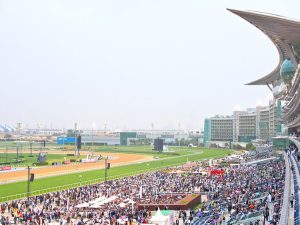The 26th Dubai World Cup 2022 will gallop off with a strong and distinguished Emirati presence at the Meydan Racecourse, amid the participation of the best horses and riders from around the world. Thousands of owners, trainers and horse racing lovers will attend the event.
The current edition will witness the participation of 131 horses from 13 countries, including 78 top-calibre horses from outside the UAE, which will compete with 53 Emirati horses that are among the strongest in the country, including Godolphin.
With a prize of US$12 million, the final race of the cup, sponsored by Emirates Airline, is expected to witness fierce competition, especially with the participation of the best American horses, which will compete with each other and against carefully prepared local horses for the 2000 meter race. There are nine group races throughout the day, including six at the elite Group 1 level, with the main event – the $12 million namesake Dubai World Cup sponsored by Emirates Airline.

Meydan Racecourse is expected to be packed to the rafters on Dubai World Cup night after organisers prepare to welcome back capacity crowds for the spectacular 26th running of the Group 1 Dubai World Cup, sponsored by Emirates Airline, on March 26.
The $12m Group 1 Dubai World Cup, sponsored by Emirates Airline, will see some of America’s top dirt performers go hoof to hoof against each other in the 2000m dirt contest.
This year, there are bound to be more thrills and spills, with horses cherry-picked by connections to have a go at the massive $30.5m in prize money, which retains the Dubai World Cup card’s status among the richest single nights in horse racing.

Rising American star Life Is Good headlines a likely field of 11 for the 26th running of the G1 Dubai World Cup (sponsored by Emirates Airline) on March 26 at Meydan Racecourse.
Winner of the G1 Breeders’ Cup Dirt Mile and Pegasus World Cup in his last two starts, the Todd Pletcher-trained Life Is Good faces stiff opposition from three of his American-based compatriots in the 2000m contest on dirt. They are Grade 1 winner Hot Rod Charlie, who has been training in Dubai since January for Doug O’Neill and who captured the G2 Maktoum Challenge Round 2 in his most recent start; Bob Baffert’s Grade 1 winner Country Grammer, and the Steve Asmussen-trained Midnight Bourbon, second and third, respectively, in the G1 Saudi Cup on February 26.
Also in the international lineup is G1 Premio Latinoamericano winner and twice Uruguayan champion Aero Trem, who takes his chance for trainer Antonio Cintra, while the second- and third-place finishers in the 2021 Dubai World Cup return for another try at the gold trophy: Chuwa Wizard from Japan and Magny Cours, trained in France by Andre Fabre for Godolphin. Saeed bin Suroor, the all-time leading trainer with nine Dubai World Cup winners, will enhance Godolphin’s chances this year with multiple European group stakes winner Real World, who captured the G2 Zabeel Mile on the Meydan turf in January.
There are two UAE-based runners, Hypothetical and Remorse, who finished first and second in the G1 Maktoum Challenge Round 3 last time out, while the sole UK raider is the William Haggas-trained Grocer Jack.

The traditional curtain-raiser for the Dubai World Cup program is the G1 Dubai Kahayla Classic (sponsored by Ithra Dubai) for Purebred Arabians, which is worth $1 million. An international field is set to include defending champion Deryan, trained in France, as is as fellow G1 winner Hadi De Carrerre. A strong home challenge is headed by G1 winners RB Rich Lyke Me, Rajeh, Brraq and Jugurtha De Monlau.
The Dubai World Cup meeting will be the finale of an exciting week of racing-related activities in the emirate.